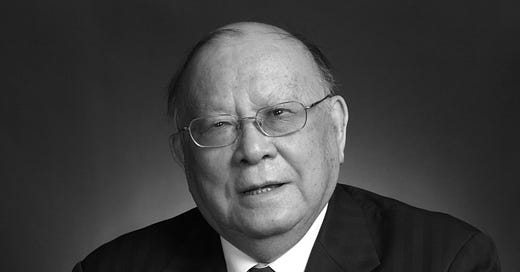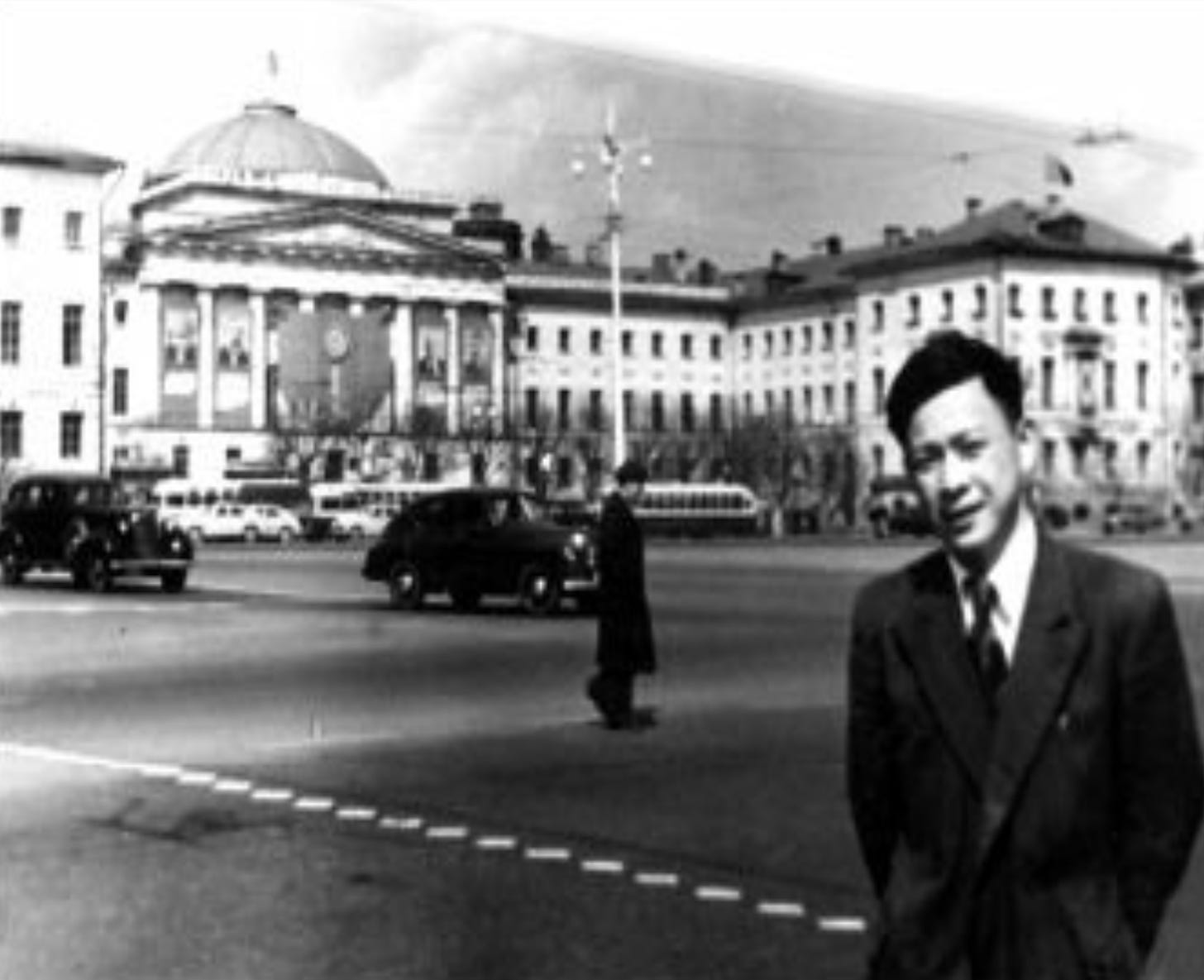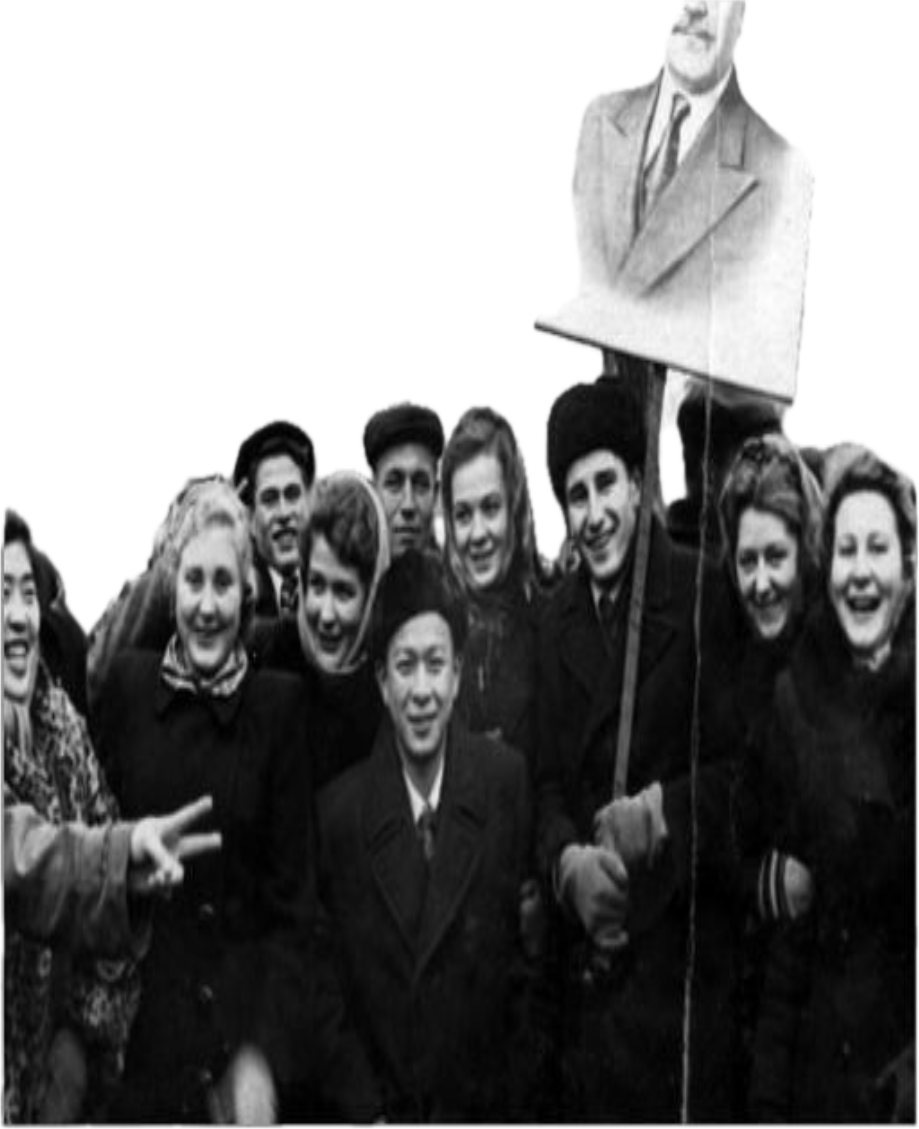Rule of Law for All Under Heaven + ChinaTalk Hiring for Production and AI Analysis
Jiang Ping, the father of China’s legal enlightenment
ChinaTalk is hiring! — looking for a multimedia content editor to help with the production cycle of our podcast and YouTube channel, as well as an AI analyst. Consider applying, and tell your friends!
I’ll be in DC next week and hosting a meetup next Wednesday. Respond to this email if you’re interested in meeting up.
Nancy Yu reports on the man behind China’s twentieth-century gasp for liberal legal norms, as well as the critical distinction between the rule of law vs. ruling by law.
Check out her past deep dives on modern Chinese history: one on science and another on economics in China’s political culture.

On December 19, 2023, Jiang Ping 江平, a legal scholar who played a key role in laying the foundation of the civil code in the People’s Republic of China and a prominent advocate for individual rights, passed away at age 92. A wave of eulogies immediately followed his passing: liberal intellectuals commemorated his contribution to China’s rule of law, while jurists hailed him as the “conscience of the Chinese legal world.” Jiang’s passing even garnered attention from the West, with a New York Times eulogy affirming his moral authority by citing his public support for the 1989 pro-democracy student protests in Tiananmen Square — a stance that cost him his university presidency.
These accolades are well-deserved. Jiang was known in the Chinese legal world for his courage, integrity, and outspokenness. In his 2010 memoir, Withering and Flourishing: An Autobiography at Age Eighty 《沉浮与枯荣:八十自述》, he wrote, “I see two qualities important for Chinese intellectuals: an independent spirit that does not succumb to any political pressure and dares to think independently, and a critical spirit that dares to criticize reality according to one’s own academic conscience.” He added, “At age eighty, my only wish is to earnestly inherit these two qualities.”
Jiang’s importance to modern China exceeds his moral authority. He was a central figure in the construction of a modern legal system in the PRC. Before 1989, he served on the advisory committee for the drafting of the General Principle of Civil Law 民法通则 and the Administrative Procedure Law 行政诉讼法. Even after he was stripped of his university presidency in 1989, he continued to be appointed to oversee the drafting of many civil and commercial laws, including Property Law 物权法, Contract Law 合同法, and Company Law 公司法. Jiang indeed was the father of the PRC’s legal enlightenment.
Today, as Xi Jinping steers the Chinese legal system further away from liberal norms, it is ever more important to remember Jiang’s contributions to the country’s legal development. While legal utilitarianism and party control dominate China’s legal system today, a look at Jiang’s life and ideas shines light on a surprisingly liberal intellectual strand that propelled the early days of China’s legal reform. It would be a mistake to conflate the Party’s approach to the law and Chinese legal thinking at large.
The Descent of Chinese Law
Building the rule of law in China was Jiang’s life pursuit. To him, the rule of law guarantees human rights, protects individual liberty, and promotes a democratic political system.
Yet looking at Jiang’s early life, he might seem like an unlikely advocate for the rule of law. Born and raised in China’s late republican era, Jiang was a progressive youth who despised the corruption and the authoritarianism of the Nationalist government. Beginning in high school, Jiang grew involved in secretive Communist organizations, joined anti-government marches, and promoted socialist ideas among student groups. When the People’s Liberation Army conquered Beijing in 1948, he immediately abandoned his university studies and joined the Communist Youth League. In 1951, the Party sent him to the Soviet Union to study law, a high honor given only to young minds the Party could fully trust politically. In many ways, Jiang was a poster child of the new Communist regime.
But Jiang’s fate took a turn after he finished his legal education in the Soviet Union. He returned to Beijing in 1956, just in time to be swept up in the maelstrom of the Anti-Rightist Campaign 反右运动, a political movement targeting intellectuals who posed a threat to the regime. Simultaneously, the relationship between China and the Soviet Union began to deteriorate, and Jiang became an easy target for political persecution. He was labeled a “Rightist” — an enemy of the revolution — and was sent to hard labor in the suburbs of Beijing.
Later, Jiang recalled that the Anti-Rightist Campaign marked the darkest period of his time. Under political pressure, his wife divorced him. While working in a labor camp, his left leg was crushed by a train. The arbitrariness and absence of a fair hearing for the persecuted intellectuals served as an admonition for what political life could descend into without the rule of law — and his suffering under political persecution helped sprout his lifelong conviction in legal reform.
Jiang’s experiences closely paralleled China’s legal environment under the Communist Party. As soon as it took power, the CCP abolished all laws from the old regime and persecuted the jurists who worked for the Republican government. With the help of the Soviet Union, the CCP rebuilt the nation’s infrastructure and implemented a planned economy. The Party sent students — like Jiang — to the Soviet Union to study the law, hoping to build a socialist legal system modeled after their Communist patron. But this effort to build a Soviet-style legal system was quickly abandoned when the relationship deteriorated between China and the Soviet Union around 1956.
In 1957, the Anti-Rightist Campaign savaged the legal institutions in China. The Ministry of Justice was dissolved, and the Central Political-Legal Cadre School 中央政法干部学校民法教研室 was merged with the Public Security Institute 公安学院. Approximately sixty faculty and students were declared Rightists in the law department at the People’s University 中国人民大学 — then the epicenter of Soviet law in China.
What ensued was next to anarchy. During the Cultural Revolution between 1966 and 1976, China’s legal world was a wasteland. A decade of political turmoil replaced all laws and customs with revolutionary ideology and the whims of the supreme leader, Mao Zedong. “We want man to govern man, not laws to govern man,” Mao declared in 1958. “When the whole country can follow an editorial of People’s Daily, what’s the point of having laws?” 要人治,不要法治。《人民日报》一篇社论,全国执行,何必要什么法律。
Rule by Law vs. the Rule of Law
The era of lawlessness under Mao Zedong left indelible scars on both the intellectuals and the CCP. Party leaders who survived the purges pledged to reform the party against personal dictatorship to ensure that something like the Cultural Revolution would never happen again. An emblematic figure in this shift was Peng Zhen 彭真. Before the Cultural Revolution, he was a senior leader in the Party and a chief proponent of the political persecution against Chinese intellectuals. Yet in 1966, he fell from the pinnacle of power when he opposed Mao Zedong’s initiatives. Twelve years in internal exile and hard labor changed his view on Party power — he began to see it as something that needed containment. When Deng Xiaoping rehabilitated him in 1978 and installed him as the head of the legislature’s committee on legal reform in 1979, Peng led the effort to build a legal framework. He was determined to replace the Maoist “rule by man” 人治 with “rule by law” 法治.1
Beyond the rejection of Maoist ideology, economic liberalization provided Peng with practical incentives for legal reform. During the planned economy, there was no private property and thus no need for laws to mediate private property rights. When the CCP started to allow private ownership and private commercial activities in the 1980s, however, disputes and transactions became too complex for administrators to manage. New economic life in China gave rise to multifarious needs in private property relations, propelling the construction of a court system and the promulgation of civil-law codes. Laws thus became a new way for the CCP to govern the country.
It was in this context that Peng started to notice Jiang’s talent. And as one of just a handful of scholars in China who had ever received a legal education, Jiang ascended as the country’s leading expert in law. In 1978, the Party restored his teaching position at the China University of Political Science and Law (CUPL) 中国政法大学. And in 1982, Peng invited Jiang to the four-person advisory committee to oversee the drafting of the General Principles of Civil Law, the first legal document in PRC history which outlined the rights and duties of private individuals. In 1986, Jiang Ping was given full control over the drafting of the Administrative Procedure Law, the first law that prescribed procedures for government action and gave citizens the right — at least on paper — to sue the government.
Beyond his role in assisting the legislature, Jiang was charged with designing the law curriculum at CUPL — which Jiang saw as an opportunity to introduce liberal legal concepts to China. In his words, he wanted the civil law curriculum to “adhere to the spirit of Reform and Opening,” which, in his understanding, was the spirit to “learn from the most advanced thinking of the West.” One of the first courses Jiang introduced to the university was Roman Law. “Roman Law liberated individuals from ancient authorities,” he argued in a 1995 lecture, “and this is its most important contribution to human civilization.” With the onset of Reform and Opening, China too faced the historic task of liberating individuals from the old authorities of the state. To Jiang, Chinese jurists had a special role in introducing the humanistic spirit of Roman Law to their country’s legal system: it was the duty of the scholars to assist the legislature in making just laws, and it was the responsibility of lawyers and judges to guard the rights of individuals against the encroachment of the state. Jiang hoped that one day the ideas in Roman Law would diffuse from the jurists to the public. By exercising their rights as enshrined in the law, every citizen could learn to see the law not only as a set of rules to be obeyed but also as a way toward self-government.
Jiang’s and Peng’s visions of the law converged in many respects. They both believed that China needed, among other things, a civil-law system (to facilitate a market economy), more lawyers and judges, and perhaps most importantly, the legal system’s broad adherence to international standards (to facilitate integration into the global economy). Nevertheless, Jiang’s idea diverged from Peng in a crucial way: while Peng believed that China’s social and political needs could be adequately addressed through “rule by law” 法制, Jiang believed that China’s reform needed to aim for “the rule of law” 法治.
In Jiang’s words, rule by law represents the structure and the system of law, while the rule of law represents the idea and spirit behind the law:
Rule by law treats the law as an instrument of the state. It describes a country that has promulgated laws and built administrative bodies, and where courts merely apply the laws and in adjudicating conflicts. These laws, however, do not have to be binding over the government. Rule by law is compatible with China’s one-party rule. The CCP treats laws and legal institutions as instruments for Party control — rule by law, far from curtailing the Party’s power, actually helps secure its power.
The rule of law, on the other hand, connects laws to higher ideals. To Jiang, these ideals are individual rights, equal protection under the law, effective checks against state power, and democratic governance. These ideals give the laws moral authority that transcends the will of the Party. It is the responsibility of judges and lawyers to advocate for these ideals independent from the state.
In the 1980s, the differences between the two visions of the law were not as obvious. For both Jiang and Peng, the most important task facing the country was filling the legal vacuum from the Mao era. In this early period of reform, China’s early legal development was driven by a double engine: the Party’s instrumentalist conception of the rule by law and the liberal jurists’ pursuit of the rule of law.
Unfortunately, as the PRC’s legal system matured, Jiang’s vision for individual rights and a limited state was a step too far for the CCP. And 1989 marked the fateful year that the two visions officially parted ways. During the student protests, Peng solidified his hardline reputation by supporting the violent suppression of student protestors. Jiang, meanwhile, was stripped of his university presidency for speaking out on the students’ behalf; everything Jiang published has been carefully monitored since then. Today, state power and an instrumentalist view of the law dominate the country’s legal system.
Jiang Ping’s Passing
Labeling Jiang as a dissident would not do him justice. Doing so would obscure his significance to the PRC legislature at the height of Reform and Opening. Jiang’s life and ideals mirrored the aspirations of many Chinese jurists who helped the Party rebuild the country’s legal system. Their commitment to individual rights, the spirit of private contracts, and limited government laid the intellectual foundation behind the drafting of many PRC laws. In his memoir, Jiang referred to the 1980s the “great law-making era” 大立法时代. That moniker encapsulated the idealism and optimism of the decade. Sadly, the Party’s determination to sustain its rule by law eclipsed Jiang’s dreams.
Last month, the Party meticulously oversaw the memorial services for Jiang. As Jerome Cohen wrote in his eulogy for Jiang, “Even in death the Party seeks to benefit from Professor Jiang Ping and keep him under control. As experience in China has shown, funerals can sometimes provide the single spark that lights a prairie fire.” While unable to disregard his passing, the regime likely views the funeral of a figure like Jiang with apprehension. After all, the memorial services for Hu Yaobang 胡耀邦, the Party leader who advocated for democratic reform, served as the catalyst for the 1989 student demonstrations.
It’s a grim time for China’s legal world. Today, Xi Jinping continues to tout slogans such as the “socialist rule [by] law with Chinese characteristics” 中国特色社会主义法治理论 and “ruling the country in accordance with the law” 依法治国. But Xi’s legal reform is a betrayal to Jiang. While the interplay between the rule of law and rule by law — as encapsulated in the visions of Jiang Ping and Peng Zhen — may continue to influence China’s legal development in the future, Jiang’s death for now symbolizes a nadir in the country’s pursuit of political reform.
Technically, 法制 is “rule by law” and 法治 is “rule of law.” (To make matters more confusing, they are pronounced exactly the same: fǎ zhì.) The CCP insists on calling their legal reforms “法治” — “rule of law” — even though it’s obvious that they really mean “rule by law.”





